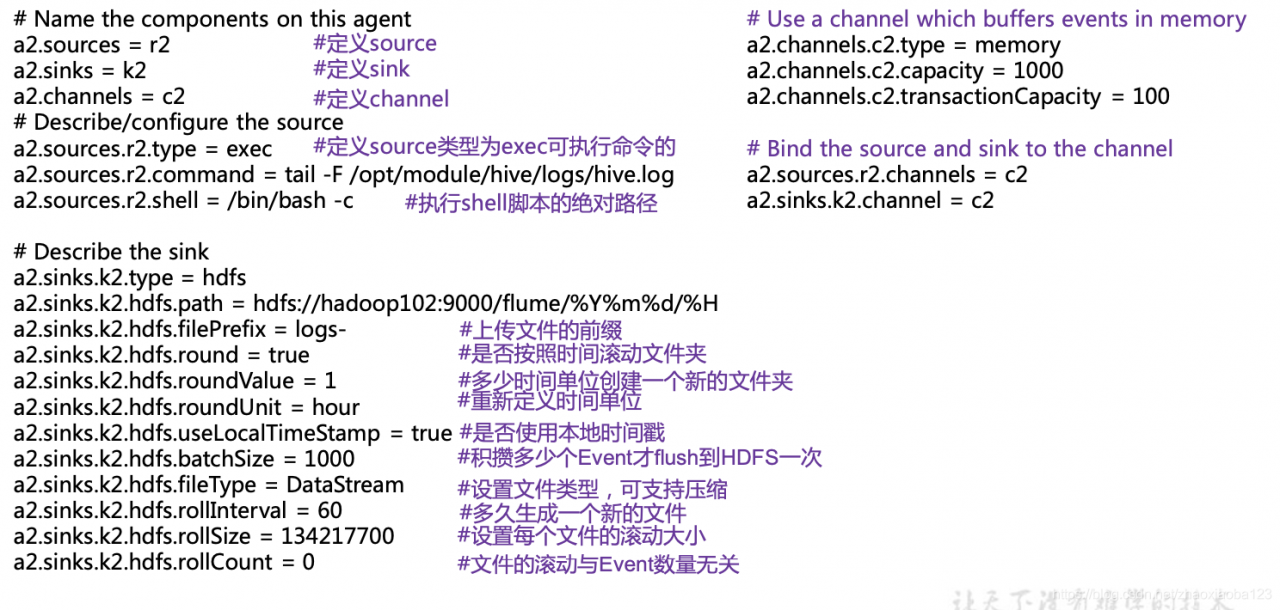Error Message: 2022-03-22 15:55:57,000 (lifecycleSupervisor-1-0) [ERROR – org.apache.flume.source.taildir.ReliableTaildirEventReader.loadPositionFile(ReliableTaildirEventReader.java:147)] Failed loading positionFile: /opt/module/flume/taildir_position.json
use flume1.9 tildir source, memory channel, hdfs sink to write a configuration file, use in hdfs no file into, and then I look at the log file, found the above error
My profile
Profile:
a3.sources = r3
a3.sinks = k3
a3.channels = c3
a3.sources.r3.type = TAILDIR
a3.sources.r3.positionFile = /opt/module/flume/taildir_position.json
a3.sources.r3.filegroups = f1 f2
a3.sources.r3.filegroups.f1 = /opt/module/flume/files/.*log.*
a3.sources.r3.filegroups.f2 = /opt/module/flume/files2/.*file.*
# Describe the sink
a3.sinks.k3.type = hdfs
a3.sinks.k3.hdfs.path = hdfs://hadoop102:8020/flume/test2/%Y%m%d/%H
#Prefix of the uploaded file
a3.sinks.k3.hdfs.filePrefix = upload-
# whether to scroll the folder according to time
a3.sinks.k3.hdfs.round = true
# how many time units to create a new folder
a3.sinks.k3.hdfs.roundValue = 1
# redefine the units of time
a3.sinks.k3.hdfs.roundUnit = hour
# whether to use the local timestamp
a3.sinks.k3.hdfs.useLocalTimeStamp = true
# accumulate how many Event before flush to HDFS once
a3.sinks.k3.hdfs.batchSize = 100
# set the file type, can support compression
a3.sinks.k3.hdfs.fileType = DataStream
# how often to generate a new file
a3.sinks.k3.hdfs.rollInterval = 600
# set the scrolling size of each file is about 128M
a3.sinks.k3.hdfs.rollSize = 134217700
# file scrolling and the number of Event has nothing to do with
a3.sinks.k3.hdfs.rollCount = 0
#Minimum number of redundancies
a3.sinks.k3.hdfs.minBlockReplicas = 1
# Use a channel which buffers events in memory
a3.channels.c3.type = memory
a3.channels.c3.capacity = 1000
a3.channels.c3.transactionCapacity = 100
# Bind the source and sink to the channel
a3.sources.r3.channels = c3
a3.sinks.k3.channel = c3
Solution:
Modify
a3.sources.r3.positionFile = /opt/module/flume/taildir_position.json,
to
a3.sources.r3.positionFile = /opt/module/flume/taildir.json
a3.sources = r3
a3.sinks = k3
a3.channels = c3
a3.sources.r3.type = TAILDIR
a3.sources.r3.positionFile = /opt/module/flume/taildir_position.json
a3.sources.r3.filegroups = f1 f2
a3.sources.r3.filegroups.f1 = /opt/module/flume/files/.*log.*
a3.sources.r3.filegroups.f2 = /opt/module/flume/files2/.*file.*
# Describe the sink
a3.sinks.k3.type = hdfs
a3.sinks.k3.hdfs.path = hdfs://hadoop102:8020/flume/test2/%Y%m%d/%H
#Prefix of the uploaded file
a3.sinks.k3.hdfs.filePrefix = upload-
# whether to scroll the folder according to time
a3.sinks.k3.hdfs.round = true
# how many time units to create a new folder
a3.sinks.k3.hdfs.roundValue = 1
# redefine the units of time
a3.sinks.k3.hdfs.roundUnit = hour
# whether to use the local timestamp
a3.sinks.k3.hdfs.useLocalTimeStamp = true
# accumulate how many Event before flush to HDFS once
a3.sinks.k3.hdfs.batchSize = 100
# set the file type, can support compression
a3.sinks.k3.hdfs.fileType = DataStream
# how often to generate a new file
a3.sinks.k3.hdfs.rollInterval = 600
# set the scrolling size of each file is about 128M
a3.sinks.k3.hdfs.rollSize = 134217700
# file scrolling and the number of Event has nothing to do with
a3.sinks.k3.hdfs.rollCount = 0
#Minimum number of redundancies
a3.sinks.k3.hdfs.minBlockReplicas = 1
# Use a channel which buffers events in memory
a3.channels.c3.type = memory
a3.channels.c3.capacity = 1000
a3.channels.c3.transactionCapacity = 100
# Bind the source and sink to the channel
a3.sources.r3.channels = c3
a3.sinks.k3.channel = c3








